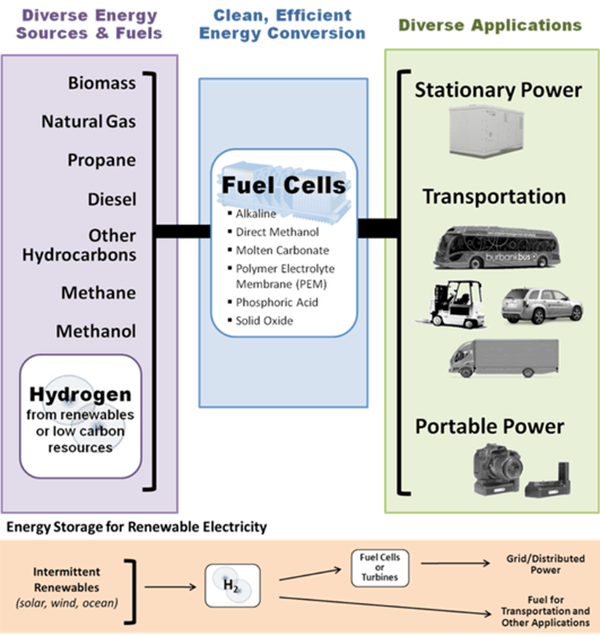Clean, Efficient, and Reliable Power for the 21st Century
Fuel cells offer a highly efficient and fuel- flexible technology that cleanly produces power and heat with low or zero emissions. Using renewably produced fuels such as hydrogen fuel cells can reduce our nation’s dependence on imported oil, leading to a secure energy future for America. With a multitude of end-uses—such as distributed power for backup, primary, and combined heat-and-power systems; automobiles, buses, forklifts and other specialty vehicles; and auxiliary power units and portable electronics—fuel cell applications hold potential to dramatically impact the 21st century clean energy economy.
The need for clean, domestically produced energy has never been greater. The energy challenges facing the nation cannot be solved by any single approach; that’s why the U.S. Department of Energy (DOE) is developing a portfolio of clean energy technologies to capture the sun, harness the wind, and utilize earth’s natural geothermal energy. DOE also pursues clean energy solutions for transportation, like nextgeneration biofuels, advanced batteries for electric vehicles, and hydrogen and fuel cell technologies.
Fuel cells and hydrogen, in particular, can play a vital role in diversifying America’s clean energy supply. Fuel cells can efficiently produce electricity from a number of domestic fuels, including bio-gas, natural
gas, propane, methanol, diesel, and hydrogen. And because they can be built to a variety of scales, fuel cells can provide power for virtually any application. Compared with traditional energy inputs, fuels cells can provide improved performance and reliability in addition to reduced lifecycle costs.
Already successfully competitive in some areas, including markets for material handling equipment and backup power, fuel cells can be competitive in other markets, such as power for critical load facilities and combined-heat-and-power, where they provide unparalleled reliability and enhanced efficiency. Continuing technological progress will enable fuel cells to compete in new markets with more stringent cost, durability, and performance requirements. As the current markets for fuel cells grow and new, larger markets emerge, fuel cells will begin to significantly benefit the nation economically and environmentally.
Hydrogen-powered fuel cell electric vehicles (FCEVs) have been identified as one technology and fuel combination that offers tremendous promise in a portfolio of technologies required for a sustainable, clean energy future. In early 2014, Hyundai launched the first FCEV available for lease in Southern California, the Tucson FCV. In November 2014, Toyota officially announced the hydrogen fuel cell vehicle available for sale for the 2016 model year. This comes fast on the heels of the unveiling of the Honda FCV concept car also in November 2014. Automakers such as Mercedes/Daimler, General Motors, BMW, Nissan, and Ford will quickly follow suit—all having committed to putting FCEVs on the road, some as early as the 2015–2017 timeframe.
Program Focus
The Fuel Cell Technologies Office maintains a balanced portfolio of activities to spur innovation, economic competitiveness, and job creation so the United States can lead the global clean energy economy. The office’s technology portfolio addresses various near-, mid-, and longer- term applications for fuel cells. Fuel cell systems research and development (R&D) is working to reduce cost and improve durability for fuel cells used in transportation, stationary, and portable applications. Hydrogen fuel R&D continues to improve hydrogen-producing technologies from renewable resources, end use delivery, and lightweight, compact, low-cost storage systems. These ongoing efforts will have crosscutting benefits for other clean energy applications.
Complementing the office’s R&D efforts, technology validation work demonstrates technologies under real-world operating conditions and provides key feedback data as the technologies progress. In parallel to its research, development, and deployment activities, the office facilitates fuel cell commercialization through safety, codes, and standards activities, and manufacturing R&D. Systems analysis guides R&D priorities and program goals by identifying research gaps for various applications and quantifying the potential benefits of hydrogen and fuel cells—including reductions in greenhouse gas emissions, criteria pollutants, and petroleum use, as well as economic and employment impacts.

Progress
A sustained R&D effort has helped hydrogen and fuel cells evolve into commercially viable technologies in growing markets. EERE funding has led to more than 500 patents, 40 commercial technologies, and 65 technologies that could enter the market in three to five years. DOE-supported activities have:
- Reduced the high-volume cost of fuel cells by 50% since 2006 and 30% since 2008 ($55/kilowatt in 2014, based on projections of high-volume manufacturing cost).
- Demonstrated more than 2,500-hour (75,000 miles) durability of fuel cell systems in vehicles operating under real-world conditions, with less than 10% degradation. This is more than double the maximum durability of 950 hours demonstrated in 2006.
- Reduced the cost of producing hydrogen from natural gas at high volume to ~$2.00/gallon of gasoline equivalent (gge)—a cost that is competitive with gasoline and reduced the cost of producing hydrogen from renewable resources to approximately $6.00–$11.50/gge dispensed and untaxed for 700 bar fueling.
- Reduced the cost of delivering hydrogen to the end-user. Since 2011, DOE has developed and demonstrated composite tube trailers that can carry 30% more hydrogen (~810kg) at a high volume cost of ~$3.00/kg.
- FCTO-funded efforts have deployed more than 800 fuel cells for backup power at cell phone towers, successfully providing electricity during more than 1,000 unscheduled system or power disruptions across 23 states since 2010. During Hurricane Sandy, the largest Atlantic hurricane on record, 5 sites provided power for over 100 hours as validated by NREL.
Encouraging a Growing Market
EERE’s success in bringing new fuel cell technologies to market is converting American innovation into American jobs. FCTO Recovery Act efforts have led to 1,400 jobs created or sustained to date and more than 450 jobs have been tracked per year due to program-funded commercial technologies since 2013. Major companies—such as Walmart, Coca- Cola, FedEx, Sysco, Wegmans, and Whole Foods—are deploying fuel cell forklifts in their warehouses and distribution facilities.
>10x Increase in Forklifts Deployed 700 DOE-funded fuel cell forklifts that led to an additional 7,500 on order or in use with no DOE funding.
>4x Increase in Backup Power Deployed 900 DOE-funded emergency backup power projects that led to an additional 4,000 with no DOE funding.
>4x Return on Investment Invested $95M in specific hydrogen and fuel cell projects that led to more than $410M in revenue.
>5x Additional Private Investment Invested $70M in specific projects that led to nearly $390M in additional private investment.
Learn More
hydrogenandfuelcells.energy.gov




